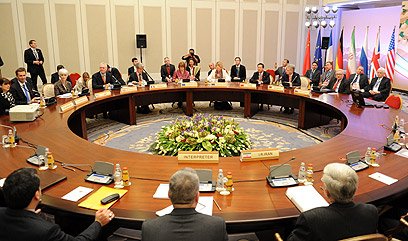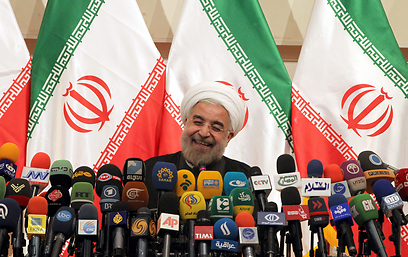On eve of Rohani inauguration, Iran's economic crisis worsens
Before Hassan Rohani's inauguration, Washington Post publishes report detailing Iran's deteriorating economy, as congress confirms new round of sanctions, analyist wonder whether economic woes will have positive or negative influence on nuclear talks
|
Hours before Iran's new president Hassan Rohani will take office, the Iranian economy seems to be on the brink of collapse, the Washington Post reported.
According to the paper, growing international sanctions in wake of the Islamic Republic's reluctance to reach a deal regarding its nuclear program are cutting deep into the country's main financial lifeline – oil exports – causing inflation and numerous other issues for Rohani to deal with.
Related stories:
- US House passes Iran sanctions bill to slash oil exports
- Jerusalem man indicted for conspiring to spy for Iran
- Rohani: Israel is 'old wound' that should be removed
According to the paper, some US officials and analysts claim the country's tidal wave of economic woes – which include an annual 45% inflation rate – will make Rohani's life all that more difficult, but could also put pressure on Iran to reach a deal with the international community in a bid to relieve the crushing sanctions already enacted against the country.

Nuclear talks between West, Iran (Archive photo: EPA)
Iranian experts put the chances for a deal as slim to none, however, recent warnings originating from within the country's leadership regarding the state of the economy hint that the nation’s top brass may be searching for a solution to quell the sanctions devastating influence.
“The Iranian elite now publicly admits that the economy is in serious trouble, and this president was elected with a mandate to do something about that,” the Washington Post quoted Clifford Kupchan, a former State Department official as saying.
“Despite Iranian rhetoric, that can only make the prospect of a deal more attractive.”

Hassan Rohani (Photo: EPA)
Amid hopes that Rohani's presidency will bring a more pragmatic approach to nuclear talks, the US House of Representatives moved on Wednesday to adopt additional sanctions to "further decimate" Iran’s economy by almost completely blocking its ability to export oil.
“If President Rohani truly has the will and authority to make a bold gesture on Iran’s nuclear program – such as suspending enrichment – he has a small window of opportunity before this bill becomes law,” the paper quoted one of the sponsors of the legislation, Rep. Eliot L. Engel as saying.
A spokesman for the Iranian government called the move “counterproductive” Friday and said they impede the odds of a nuclear deal.
“There is no doubt that such decisions will unnecessarily complicate the current situation between the two countries,” Alireza Miryousefi, a spokesman for Iran’s diplomatic mission to the UN said.
Economy contracting
Politically, the sanctions have been blamed for cutting Iran’s oil exports and the devaluating of the Iranian currency – the rial. However, new Western sanctions and tougher enforcement have made maters worse.According to the paper, Iranian officials reported last month that is up 45%, a 13% jump in comparison to this time last year, and for the first time in 30 years, the economy is expected to contract.
Iran’s oil exports, have been reduced nearly 40%, and have taken an additional blow recently as Iran’s remaining customers in Asia were forced to cut back on purchases.
Additionally, the paper reported that a draft of a report by economic research firm Roubini Global Economics estimate that the country's foreign currency holdings are declining at a rate of roughly $15 billion a year as the government is forced to cut into savings to satisfy budgetary needs.
To make matters worse, banking sanctions block the government from tapping into the country's reserves, being kept abroad.
"Iran is in serious trouble,” said Mark Dubowitz, director of the Foundation for Defense of Democracies, a Washington-based think tank that co-sponsored the recent study.
No comments:
Post a Comment